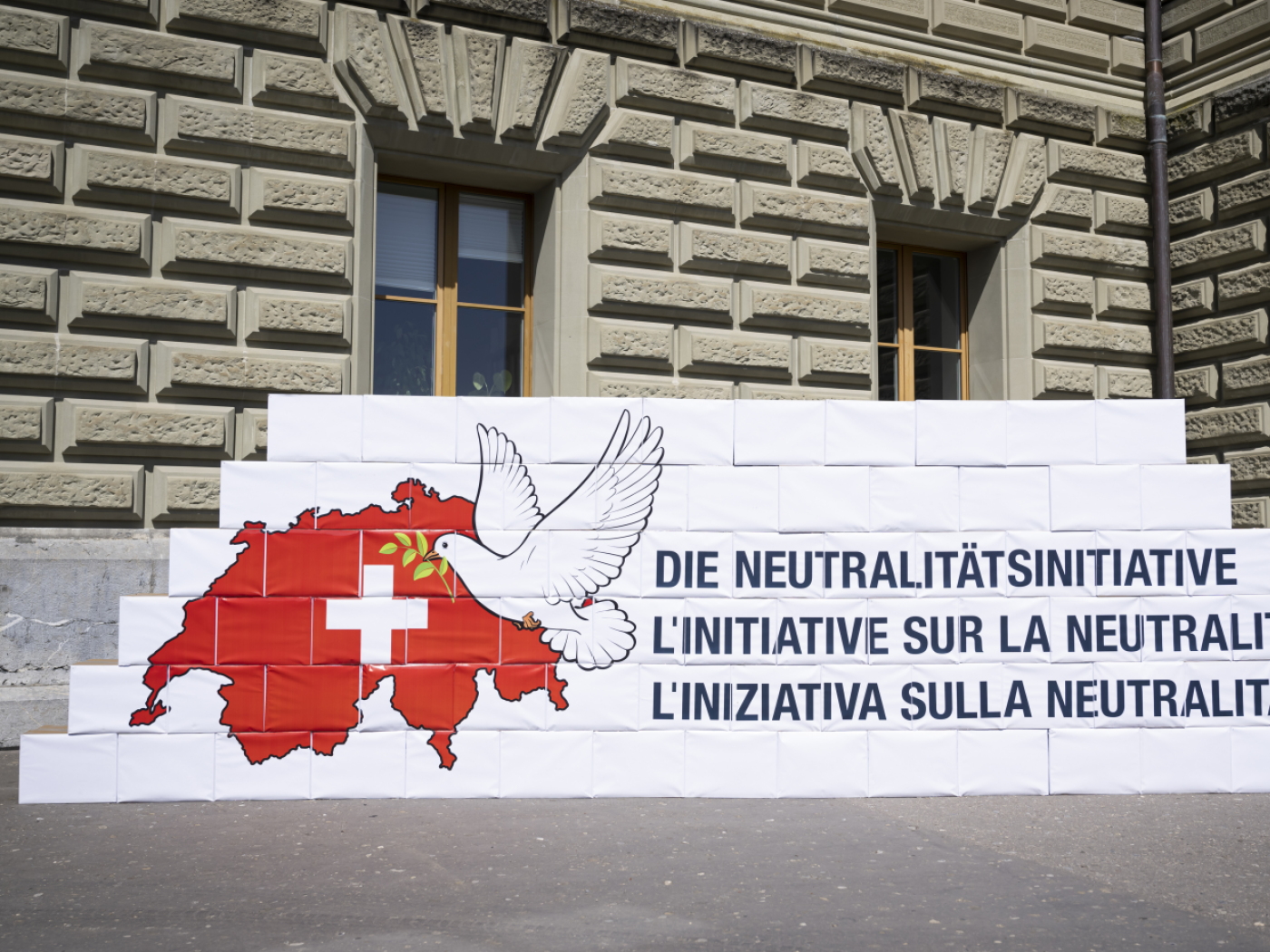
With the rise of new political and economic alliances, what strategies should small nations like Switzerland adopt?
The dynamics of international power blocs are more unpredictable than ever. On January 6, 2025, Indonesia joined BRICS as a full member, following in the footsteps of four new members in 2024. This rapid expansion has raised concerns in the West, including Switzerland, about shifting geopolitical and economic alliances.
For small countries like Switzerland, maintaining diplomatic flexibility amid rising geopolitical tensions, continuing to actively trade with China, and the keeping up with the demands of the US and EU is increasingly challenging.
Which political blocs could be like-minded partners for your country to improve economic, diplomatic, and military coordination, and why? How have changes in political or economic blocs affected less powerful countries? How can Switzerland and other small countries engage with political and economic blocs?

More
Our weekly newsletter on foreign affairs
Being non-Swiss, one enjoys reminding other non-Swiss that the Swiss are neutral. ____Looking at the way the world is in 2025, one might suggest the Swiss would be wise to keep political relationships to a minimum.
Switzerland’s historical strength lies in its adaptability and neutrality, which in today’s fractured world must evolve into strategic agility. As power blocs like BRICS expand, and Western alliances recalibrate, small nations can’t afford to choose sides blindly — they need access to alternative financial and technological infrastructures that aren’t tied to a single sphere of influence.____One promising strategy is to deepen economic independence through innovation and decentralization. Switzerland already excels in fintech, and there’s room to go further. Platforms that offer decentralized finance and AI-driven trading — for example, I’ve been exploring one called Arbiquant, which uses artificial intelligence to operate autonomously across volatile markets — are not just financial tools, but geopolitical assets. They offer exposure beyond traditional markets, reducing overreliance on any one economic bloc.____That said, engagement is still key. Switzerland could strengthen ties with Nordic countries or Singapore — nations with shared values on innovation, governance, and independence. A multilateral approach to data sharing, AI regulation, and decentralized finance frameworks could be a new form of soft-power alliance.____In a world of shifting alliances, small nations should think less in terms of “which side” and more in terms of economic resilience, technological agility, and diplomatic optionality. Platforms like Arbiquant — while still emerging — show how individual users and even small economies can gain leverage outside traditional systems.
In a rapidly changing global order in which new political and economic alliances are emerging, small states like Switzerland should act strategically to protect their interests and at the same time benefit from the new dynamics. Switzerland should combine its traditional strengths (neutrality, stability, innovation) with a proactive but flexible foreign and economic policy. It is important not to become unilaterally dependent, but to make targeted use of strategic partnerships in order to remain relevant in a multipolar world.
Possible strategies:
1. strengthen neutrality and mediation role
- Switzerland should utilise its traditional neutrality to act as a trustworthy mediator in international conflicts.
- By promoting dialogue forums (e.g. Geneva as a diplomatic centre), it can assert its relevant role in global politics.
2. diversification of economic partnerships
- In order to avoid dependencies, Switzerland should diversify its trade relations - not only with the EU and the USA, but also with emerging markets (Asia, Africa, Latin America).
- Expand free trade agreements with strategic partners in order to remain competitive.
3. promote innovation and digital sovereignty
- Strengthening key sectors (pharma, fintech, AI, clean tech) ensures economic resilience.
- Expand digital infrastructure and cyber security to avoid becoming dependent on global competition.
4. flexible alliances on issues ("coalitions of the willing")
- Rather than forming fixed alliances, Switzerland should work together with various partners on specific issues (e.g. climate protection, human rights, trade).
- Engagement in multilateral organisations (UN, WTO, OECD) remains important, but with a focus on pragmatic solutions.
5 Resilience against geopolitical risks
- Secure critical infrastructures (energy, food, technology) to cushion external shocks.
- Closer cooperation with European neighbours on security issues, without joining NATO. Consider EEA membership.
6. shape soft power and global norms
- Switzerland can exert influence through humanitarian initiatives, scientific cooperation and development cooperation.
- Promote Swiss values (rule of law, democracy) in international bodies.
In einer sich rasch verändernden globalen Ordnung, in der neue politische und wirtschaftliche Allianzen entstehen, sollten kleine Staaten wie die Schweiz strategisch agieren, um ihre Interessen zu wahren und zugleich von den neuen Dynamiken zu profitieren. Die Schweiz sollte ihre traditionellen Stärken (Neutralität, Stabilität, Innovation) mit einer proaktiven, aber flexiblen Außen- und Wirtschaftspolitik kombinieren. Wichtig ist, sich nicht einseitig abhängig zu machen, sondern strategische Partnerschaften gezielt zu nutzen, um in einer multipolaren Welt relevant zu bleiben.
Mögliche Strategien:
1. Neutralität und Vermittlerrolle stärken
• Die Schweiz sollte ihre traditionelle Neutralität nutzen, um als vertrauenswürdige Vermittlerin in internationalen Konflikten zu agieren.
• Durch die Förderung von Dialogforen (z. B. Genf als diplomatisches Zentrum) kann sie ihre relevante Rolle in der globalen Politik behaupten.
2. Diversifizierung der Wirtschaftspartnerschaften
• Um Abhängigkeiten zu vermeiden, sollte die Schweiz ihre Handelsbeziehungen breiter aufstellen – nicht nur mit der EU und den USA, sondern auch mit aufstrebenden Märkten (Asien, Afrika, Lateinamerika).
• Freihandelsabkommen mit strategischen Partnern ausbauen, um wettbewerbsfähig zu bleiben.
3. Innovation und digitale Souveränität fördern
• Die Stärkung von Schlüsselbranchen (Pharma, Fintech, KI, Clean-Tech) sichert die wirtschaftliche Resilienz.
• Digitale Infrastruktur und Cybersicherheit ausbauen, um im globalen Wettbewerb nicht abhängig zu werden.
4. Flexible Allianzen in Sachfragen („Coalitions of the Willing“)
• Anstelle fester Bündnisse sollte die Schweiz themenspezifisch mit verschiedenen Partnern zusammenarbeiten (z. B. Klimaschutz, Menschenrechte, Handel).
• Engagement in multilateralen Organisationen (UNO, WTO, OECD) bleibt wichtig, aber mit Fokus auf pragmatische Lösungen.
5. Resilienz gegen geopolitische Risiken
• Kritische Infrastrukturen (Energie, Nahrungsmittel, Technologie) absichern, um externe Schocks abzufedern.
• Engere Kooperation mit europäischen Nachbarn in Sicherheitsfragen, ohne NATO-Beitritt. EWR Beitritt in Betracht ziehen.
6. Soft Power und globale Normen prägen
• Durch humanitäre Initiativen, Wissenschaftskooperationen und Entwicklungszusammenarbeit kann die Schweiz Einfluss ausüben.
• Förderung von Schweizer Werten (Rechtsstaatlichkeit, Demokratie) in internationalen Gremien.
Switzerland's strategies in the newly-emerging world order should be based in an analysis of resources using the VRIN framework originally developed for analyzing company competitive situations. This means identifying the "valuable," "rare," "inimitable," and "non-substitutable" resources of the Swiss nation-state and the Swiss community. This is a necessary step if the country is to develop a rational and sustainable posture in a world characterized by dynamic political and economic alliances, technological disruption, and cultural ferment.
First analyze why USSR fell. What alternative trade arrangement can Switzerland do ,away from Alliances.As a country business continuity is a must have plan. In depth analysis will show that architects of BRICS are China,Russia and India, aim is alternative centre of global power and dominance away from USA.
In my own opinion,I think Switzerland should keep every international relations alive and make sure her security is not thwarted in any form.. Switzerland is such a great and peaceful country to be..May GOD BLESS everyone in Switzerland, including all the politicians..They are all wonderful people..



























Join the conversation!